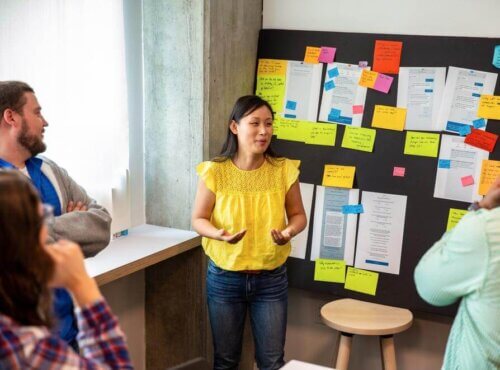To support the development of high-quality career exploration and career development experiences in middle and high schools across the state, the Illinois State Board of Education tapped EdSystems to help facilitate a community of practice and technical assistance supporting a one-year pilot program. During the 2021–22 school year, EdSystems facilitated four communities of practice, including a pilot showcase in April that was open to attendees outside of the pilot to learn from the pilot models and provided one-on-one technical assistance.
Participating communities submitted their career exploration or career development experience pilot models and related resources to help peers scale the work. In addition, we distilled the feedback received from pilot sites into best practices, lessons learned, and recommendations for policy and supports to help better inform the field:
Best Practices and Lessons Learned
The following takeaways are based on the best practices and lessons learned shared by the pilot communities:
1. Create clear communication and roles within the team that is designing and implementing the experience.
To support the career exploration pilot, Kewanee School District first established a team at Neponset Grade School that consisted of grade-level teachers, students, parents, and the 21st century coordinator. The team provided the Kewanee School District with an opportunity to define roles and responsibilities from the start as they grappled with what they would do from the start. The team will continue to be in place in subsequent school years. Throughout the planning process, they surveyed the students and parents to determine the most valuable options for their career exploration activities.
Crete-Monee High School shared that a lack of communication with the coordinating staff delayed their progress in engaging students in the virtual platform to ensure the Educators Rising experience would be meaningful and accessible for students. The core planning team at Crete-Monee took the opportunity to restart the process from the beginning and engage all coordinators to create a more streamlined and open communication process moving forward.
2. Incorporate student voice to direct planning, recruitment, and implementation efforts.
Elm Middle School used the pilot grant opportunity to enhance and scale their career elective courses to incorporate direct engagement with industry partners and offer course opportunities in additional career cluster areas. In former school years, the leadership team offered these courses based on what their staff was qualified to teach but saw that some courses continued to have low enrollment. This year, they utilized 5th grade interest surveys to develop courses for 6th-8th graders based on their expressed career interest areas.
As a part of the Makerspace Internship pilot, Chicago Public Schools shared their learnings on recruiting male students more intentionally. Typically, staff emailed the application and overview to nominated students to inform them of the internship opportunity. However, they found that female students were overrepresented in their application submissions, and they determined that this resulted from females being more likely to respond to emails than their male peers. To address this, Chicago Public Schools developed a nomination letter that they handed directly to male students and addressed any questions they had in real-time.
3. Start with one industry area to develop a model and framework before expanding into other areas.
Tremont Middle School started the school year with a plan to implement career exploration simulation activities in both manufacturing and health sciences but quickly realized they did not have the capacity on their team to do both areas effectively. They instead moved to a two-year implementation process where they could pilot the manufacturing simulation activity and industry engagement to inform their work the following school year. Based on their reflections and learnings from the manufacturing pilot, they have discovered the importance of accounting for the time needed to train students on the equipment and creating meaningful dialogue between their students and industry professionals as they engage in the simulation activities.
Belvidere District 100 utilized the pilot opportunity to develop industry relationships and build a framework for career development experiences in manufacturing. Beyond what students may be accessing outside of school, Belvidere District 100 had no consistent framework for students being placed into and completing an internship. Throughout this process, they learned about how to navigate payment and liability issues through their EFE and worked closely with industry partners to interview students and refine internship job descriptions. Working through one industry area internship has helped Belvidere District 100 understand the timeline and needs for building out internships in other industry areas.
Recommendations for Policy and Supports
Attendees at communities of practice frequently noted on the feedback forms the value of learning what other communities are planning or implementing and forming connections with their peers. As ISBE continues to support communities to enhance and scale their work-based learning opportunities, the following recommendations are provided to support that work:
1. Provide guidance and best practice models on the EFEs’ role in supporting student payment and liability issues for career development experiences and in partnership development for schools.
Belvidere District 100’s legal team had concerns at the beginning of the school year that the district would be unable to place students in paid, off-site internships. Through connecting with another pilot site, the Northern Kane County Regional Vocational System EFE 110, District 100 learned how their EFE can support the payment and liability needs between the school and employer partners. The District 100 breakout room was one of the most attended at the April showcase, as many communities wanted to understand better how they worked through their EFE to address the legal team’s concerns and place students in paid internships at various employer partners.
The past years have made the capacity for engaging in work-based learning difficult. As the Valley Education for Employment System (VALEES) worked with their schools to determine how they wanted to utilize the pilot grant funds, they heard over and over again that schools need industry partners who are prepared to work with students. VALEES proceeded to create an internship micro-credential that is available as a statewide resource for employers to earn a badge demonstrating their readiness to host a high school intern. A larger learning for VALEES from this process is how to enhance their role in communicating with industry partners to ensure that they understand the expectations and are ready to host work-based learning experiences across the continuum before connecting them with a contact at the school level. The more ready industry partners are to work with the EFE, the more productive and meaningful their connection with a school will be.
2. Organize engagement opportunities for communities to connect statewide and regionally to learn from their peers about work-based learning models.
As Vienna High School and other schools in their region determined how to utilize their pilot grant funds, they had concerns about what to prioritize and how to use the funds effectively based on capacity at each school. The five schools in southern Illinois that were eligible for funding took the opportunity to meet in person to receive professional development on aligning their efforts to state frameworks. EdSystems led the professional development session at Vienna High School, which focused on College and Career Pathway Endorsements, model programs of study, and the state-defined work-based learning continuum. Vienna High School also shared its work-based learning and electronic portfolio models as a regional example. This convening created an opportunity to build connections among regional school staff to better support bandwidth and capacity by sharing models and resources. The Southern Illinois region is continuing these convenings and plans to rotate meeting locations so that there is a representation of how each school is addressing work-based learning to align efforts and resources across the region.
3. Publish work-based learning models across the continuum with as many details as possible from College and Career Pathway Endorsement applications.
One of the resources EdSystems was most asked for at the start of the school year was a list of the pilot plans regions were considering. Regardless of whether the pilot plans submitted were detailed paragraphs or a few sentences, communities found these incredibly helpful to kickstart their design and planning process. Providing a whole view of work-based learning from the beginning of the continuum helps communities see how the industry engagement and complexity of experiences should increase over time to provide high-quality work-based learning for students.
Learn More
EdSystems continues to lead efforts to bring together communities through the Illinois Work-Based Learning Innovation Network (I-WIN), which is designed to:
- Highlight and explore innovative models for work-based learning with a current focus on virtual opportunities.
- Engage in conversations on creating sustainable, high-quality models that provide broader and more equitable access to work-based learning, building social capital for Black and Latinx students.
- Build community connections to offer best practices, learnings, and resources.
- Identify needs for state policy changes or support systems.
Join school districts and community colleges across Illinois as we share learnings about leveraging innovative models for scaling high-quality work-based learning opportunities.



